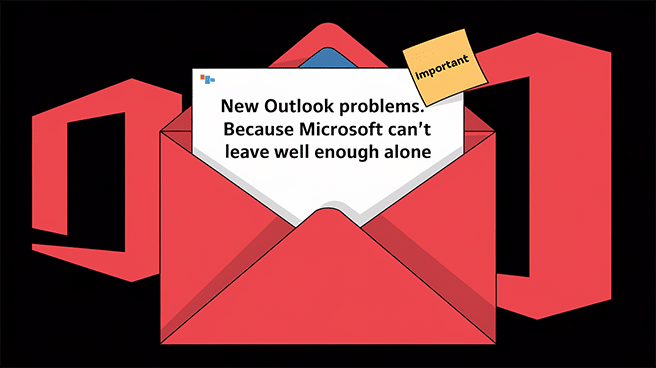💡 DIY Computer Fixes?
Grab my easy step-by-step guide and keep your computer running like new.
New Outlook Problems
Microsoft has begun rolling out The New Outlook, a redesigned version of the classic Outlook app. While this update aims to modernize the experience, many users are encountering issues, including missing features, sluggish performance, and a steep learning curve.
What’s Changing?
The New Outlook brings a more web-based interface, closer to Outlook.com, with tighter integration with Microsoft 365. However, several familiar features—like offline support for certain accounts, third-party add-ins, and customizable toolbars—are missing or limited.
Common Issues Reported
- Missing Features: Many tools users rely on, such as PST file support and custom rules, are not available.
- Performance Problems: Some users report sluggish loading times and glitches.
- Compatibility Issues: Certain email accounts and add-ins may not work as expected.
How to Revert to Classic Outlook
If you’re experiencing problems with the new version, you can switch back:
- Open Outlook and look for the “Try the New Outlook” toggle in the upper-right corner.
- Click the toggle to turn it off.
- Restart Outlook, and it should revert to the classic version.
For now, Microsoft allows users to switch back, but this option may not be available indefinitely. If you’re not ready for the changes, it’s best to stay on the classic version while Microsoft continues refining the update.
Need help with Outlook or any other tech issues? I’m here to help! Just visit That Tech Jeff.
If you don’t see a “Try the New Outlook” toggle, Microsoft may have fully transitioned your version of Outlook, or your settings might be managed by your email provider. However, you may still be able to revert to the classic version by following these steps:
How to Switch Back to Classic Outlook (If Possible)
For Outlook on Windows:
- Check the Control Panel
- Open Control Panel → Programs & Features.
- Find Microsoft Outlook (or Microsoft 365).
- See if an option exists to uninstall the New Outlook and revert to the classic version.
- Reinstall the Classic Outlook
- If you have a Microsoft 365 subscription, go to Microsoft’s official download page and reinstall the older Outlook version from your account settings.
- Use Outlook for Web (Outlook.com)
- If you’re stuck with the new version and dislike it, consider accessing Outlook through Outlook.com for a more familiar experience.
For Outlook on Mac:
- Microsoft has removed the ability to revert to Classic Outlook on Mac in newer updates. If you recently switched, check Preferences → General and look for a “Classic Outlook” option. If it’s missing, you may need to install an older version (if available).





